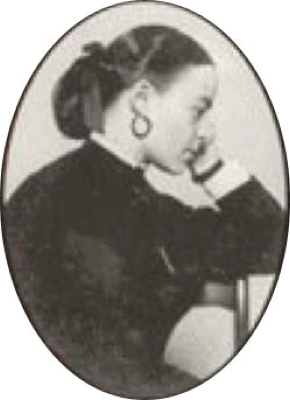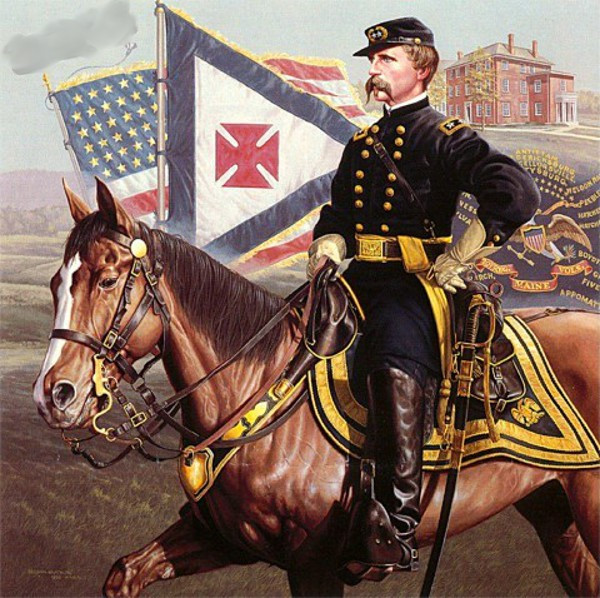Fanny Chamberlain: Heroine In A General’s Love Story (Part 2)

(This is Part 2 of an article published yesterday)
July 17, 1863
My dear Fanny
I was very much surprised to have a letter from you dated at New York. I have been writing you at Brunswick. I wrote you on my knee in the battle of Gettysburg, after our terrible fight in which the 20th held the post of honor on the extreme left of the whole army where the fiercest attack was made. I will tell you sometime of the magnificent conduct of the Regt… I wish you were at home. You should have been there before…[i]
Gettysburg – the most well-known conflict of Joshua Lawrence Chamberlain’s military experience – reflects a common trend in his marriage relationship during the war years. He continually reached out to his wife through letters, sharing experiences and thoughts, seeking approval or sympathy, and trying to make sure she did not feel “abandoned.” Fanny Chamberlain’s self-centeredness came to the forefront during the Civil War; she was not a steady correspondent and often left her children and home for traveling jaunts and shopping tours in the cities.[ii] While her actions must have concerned Lawrence and deprived him of an important element of homefront support, he does not seem to blame her or scold her angrily, only occasionally suggesting that she stay home.
In September 1863, Lawrence was able to visit his family in Maine, taking time to recover from fever and/or undiagnosed post-traumatic stress disorder. It was a special time with his young children and a relationship re-connection with Fanny; his letters written immediately after his return to the military are full of good-humored teasing.[iii]
Late autumn of 1863 sent Lawrence to the hospital with a serious fever and illness. Fanny traveled from Maine and spent several months with him at the military hospital and later at their temporary residence in Washington D.C. When he was able to rejoin his regiment in May 1864, Fanny returned home.

The Battles of Wilderness, Spotsylvania, and Cold Harbor failed to break the Confederate defensive lines, and the Union Army of the Potomac swung south, across the James River and heading for Petersburg. Grant was anxious to capture the city and began launching attacks against the Petersburg defenses which had received Confederate reinforcements. Acting as brigade commander, Lawrence received orders to attack a forward salient, using the front assault method with no cover for his advance troops. He respectfully detailed the situation and asked the generals to reconsider, but again received orders to attack.
June 18, 1864. “Comrades, we have now before us a great duty for our country to perform… We know that some must fall, it may be any of you or I; but I feel you will all go in manfully and make such a record as will make all our loyal American people grateful…”[iv] Drawing his sword, Lawrence started to lead the advance. The field was dotted with small bushes and briers; ahead, there was swampy ground. With canister and rifle fire raking the ranks, venturing into the soft ground would be detrimental. He turned, trying to motion and move the troops away from the bog. A bullet slammed into his right hip, passing through his lower body. Pain and gushing blood told Lawrence he was wounded; afraid to let the vanguard see him fall, he leaned on his sword, trying to remain upright. Eventually, he collapsed in the Virginia dirt. The stretcher bearers came for him hours later and by nightfall the surgeons at the field hospital were operating, but expressing doubt that he would survive.
June 19th 1864
My darling wife
I am lying mortally wounded the doctors think, but my mind & heart are at peace[.] Jesus Christ is my all-sufficient savior. I go to him. God bless & keep & comfort you, precious one, you have been a precious wife to me. To know & love you makes life & death beautiful. Cherish the darlings & give my love to all the dear ones[.] Do not grieve too much for me. We shall soon meet[.] Live for the children[.] Give my dearest love to Father & mother & Sallie & John[.] Oh how happy to feel yourself forgiven[.] God bless you evermore precious precious one Every yours, Lawrence[v]
The news reached Maine, and family members rushed to join him at the base hospital in Annapolis, Maryland, where he had been moved. It’s not clear when Fanny left Maine and arrived at the hospital, but she did go. She found Lawrence with a positive mind-set, hoping to recover to use his new military promotion to brigadier-general and planning survive the obituary printed by the newspapers. It would be a long road to recovery, and complete healing would never occur.
Details about Fanny’s role in Lawrence’s recovery are scanty. The long summer and autumn days must have been difficult in many ways. Not only was Lawrence incapacitated in a hospital bed, needing constant supportive care, but Fanny was pregnant with their fifth (and last) child. Whatever the details and however the hospital days strained or strengthened the couples the relationship, one thing is clear. Fanny Chamberlain was there “long days and nights together through the delirium of mortal anguish.”[vi]
In the autumn, Lawrence went home to Maine, continuing his recovery in the family home setting. Weeks later – on November 18, 1864, exactly five months after his injury – Lawrence returned to military duty. Why he insisted on returning so quickly, and why Fanny let him go, is mysterious. He was not recovered, and she was about two month from the birth of their child. But he went, found military duties too fatiguing, and early in 1865, received a leave of absence for surgery in Philadelphia and a visit home. The time at home was brief, but Lawrence saw his new baby daughter, Gertrude Lorraine.

Leaving Fanny and the children at home, Lawrence returned to the army, in time for the Appomattox Campaign. It was a rough few weeks of marching and hard fighting. Slightly wounded again and still suffering from the 1864 injury, Lawrence soldiered on, arriving at Appomattox Court House and watching with dazed unbelief as a Confederate officer approached the Union lines with a white flag. General Grant and General Lee negogiated the terms of surrender on April 9th, the parole process began, and the formal surrender ceremony was scheduled for April 12th. General Chamberlain was asked to preside as the Southerners marched out and laid down their weapons and flags. In a generous gesture, Lawrence ordered his Union troops to salute the returning Southerners, attempting to pave the reunion road.
Lincoln’s assassination, the Grand Review of the Army of the Potomac, and mustering out created conflicting emotions for the general. Both happy to return home and sorrowful to leave behind the army life, he arrived in Maine. Adjusting to quiet civilian life was not easy, and the loss of Baby Gertrude plunged both Lawrence and Fanny into sorrow. He tried to settle into college teaching again as a way to deal with the past. In December, the couple celebrated their 10th wedding anniversary; Lawrence surprised his bride with a custom designed bracelet from Tiffany jewelers in New York City to commemorate his war “successes”[vii] and her role as a general’s wife.[viii]

The next years would strain the Chamberlain marriage. Lawrence decided to run for (and eventually served four one-year terms) as Governor of Maine, instead of remaining a college professor. War-wounds, possible post-traumatic stress disorder, and new-found assertiveness and command temperament had changed Lawrence’s character. Irritated by all the changes in public and personal life and perhaps not thinking rationally, Fanny began spreading rumors about marital abusive, suggesting that she and Lawrence were getting a divorce. From his governor post, Lawrence wrote home, shocked at what he had overheard.
Eventually, the couple repaired their relationship and came to an understanding. In the following decades, Lawrence pursued educational opportunities, business ventures, and world travel. As long as her health allowed, Fanny traveled with him and supported most of his endeavors.
Old age did not diminish the Chamberlain love story. Lawrence wrote romantic letters to Fanny on special occasions, took her shopping to indulge her enthusiasm for fine clothes, and guided his wife through social events when she lost her eyesight. In summer 1905, Fanny had a bad fall and broke her hip; on October 18, she passed away. The next nine years were hard for Lawrence, but he tried to focus on the blessings he still had: his daughter and grandchildren, friends, and memories to share through writing and speeches.
The old man had paused in his writing. He picked up the bracelet and traced the military inscriptions. What a love story…he thought. Rough and tender, passionate and cold, happy and bittersweet; through it all, he had loved her, and he knew that ultimately she had loved him too.
Someday, he would be gone. He wanted them to find his papers. His bundles of letters. He wanted them to read, discover, and know the truth and his life…and hers, intertwined with conflict, romance, and – in the end – abiding love. Maybe no one would understand Fanny the way he did. He wanted her to be remembered for the strength she eventually found and the courage she had given him.
He picked up the pen. He had been writing his memories of the Grand Review; he had written about the women watching the procession and their patriotic efforts during the war. This was the right place, he thought; in all his war papers, there could be no better place to memorialize and honor his wife. It had been a moment of triumph, that parade…and she was the reason for his triumph.
You in my soul I see, faithful watcher by my cot-side long days and nights together through the delirium of mortal anguish, – steadfast, calm and sweet as eternal love. We pass now quickly from each other’s sight; but I know full well that where beyond these passing scenes you shall be, there will be heaven![ix]

[i] Mark Nesbitt, Through Blood & Fire: Selected Civil War Papers of Major General Joshua Chamberlain (1996), Pages 97-98.
[ii] Edward G. Longacre, Joshua Chamberlain: The Soldier and The Man, (2009), Page 120.
[iii] Mark Nesbitt, Through Blood & Fire: Selected Civil War Papers of Major General Joshua Chamberlain (1996), Pages 108-109.
[iv] Alice Rains Trulock, In The Hands of Providence: Joshua L. Chamberlain & The American Civil War, (1992), Page 207. JLC’s speech to his men before the charge.
[v] Mark Nesbitt, Through Blood & Fire: Selected Civil War Papers of Major General Joshua Chamberlain (1996), Page 137.
[vi] Joshua Lawrence Chamberlain, “Bayonet! Forward”: My Civil War Reminiscences, (1994), Page 170.
[vii] Mark Perry, Conceived In Liberty: Joshua Chamberlain, William Oates, and The American Civil War, (1999), Page 315. The bracelet was constructed of gold and diamonds and inscribed with each battlefield where Lawrence fought.
[viii] Alice Rains Trulock, In The Hands of Providence: Joshua L. Chamberlain & The American Civil War, (1992), Page 331.
[ix] Joshua Lawrence Chamberlain, “Bayonet! Forward”: My Civil War Reminiscences, (1994), Page 170.
I visited the Chamberlain home in Brunswick two years ago. I was surprised how his private life was played out in such a small setting. His home, church, college, and family cemetery all within a short walking distance. His home seemed very modest to me. His story has always held an interest for me. I had cousins and a great uncle that served with him in the 20th Maine. Enjoyed your post very much.